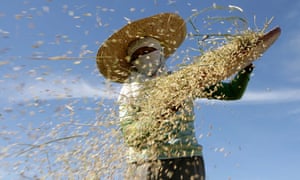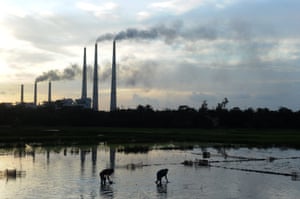https://www.theguardian.com/environment/2018/may/23/climate-change-will-make-rice-less-nutritious
Climate change 'will make rice less nutritious'
When scientists exposed the crop to higher levels of carbon dioxide vitamin levels fell significantly
Rice will become less nutritious as carbon dioxide levels in the atmosphere rise, potentially jeopardising the health of the billions of people who rely on the crop as their main source of food, new research suggests.
Scientists have found that exposing rice to the levels of carbon dioxide that are expected in the atmosphere before the end of the century results in the grain containing lower levels of protein, iron and zinc, as well as reduced levels of a number of B vitamins.
“About two billion people rely on rice as a primary food source and among those that are the poorest, often the consumption of rice in terms of their daily calories is over 50%,” said Dr Lewis Ziska, a co-author of the research from the United States department of agriculture. “Anything that impacts rice in terms of its nutritional quality is going to have an impact.”
While higher levels of carbon dioxide have previously been linked to lower levels of certain nutrients, such as proteins, in various crops, the study is the first time researchers have also looked at the impact on vitamins.
Writing in the journal Science Advances, researchers report how they explored the impact of increasing carbon dioxide levels on rice by conducting experiments on 18 different types of the crop at sites in China and Japan between 2010 and 2014.
The rice was grown in paddy fields, with large octagonal ring-structures installed above the crops. These rings were either supplied with carbon dioxide, or not. The concentration of carbon dioxide the plants were exposed to was monitored at the centre of each ring, and the rice produced by each crop was collected and analysed.
The results reveal that crops that were exposed to higher levels of carbon dioxide were on average less nutritious, regardless of the country they were grown in, containing about 10% less protein, 8% less iron and 5% less zinc than rice grown under current levels of carbon dioxide. What’s more, levels of vitamins B1, B2, B5 and B9 also fell, with the latter dropping on average by more than 30%. By contrast, levels of vitamin E rose. Ziska said these differences might be linked to whether the various vitamins and nutrients contain nitrogen, with those that do typically seeing a drop in levels as carbon dioxide rises and those without seeing a rise.
But with some of the varieties of rice apparently showing little change in levels of certain nutrients, the researchers say it might be possible to find or develop types of rice that will remain nutritious as the climate changes.
A drop in the nutritiousness of rice as a result of climate change could have profound health effects, particularly for those who rely most heavily on the crop, with the authors warning that it could affect early childhood development and worsen the impact of diseases including malaria.
Among the countries expected to be worst hit by a lower nutritional content of rice would be Bangladesh and Madagascar.
Ziska said it was crucial to do further research into why levels of carbon dioxide affect nutrient levels, suggesting that it may be because the crops grow faster.
He also stressed the need for research on other crops. “Many important cereals like wheat as well as staples like potatoes may be impacted by this as well,” he said.


沒有留言:
張貼留言